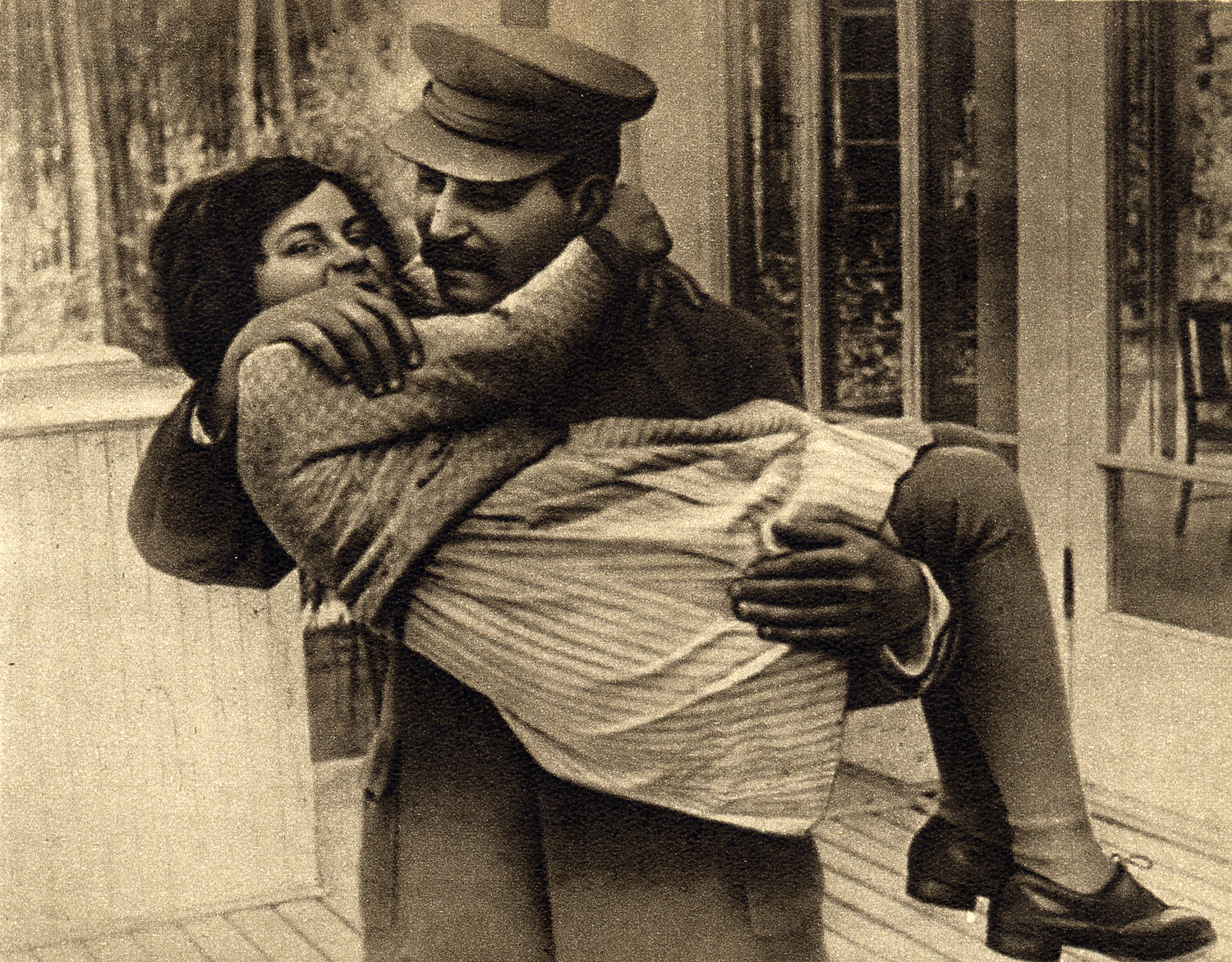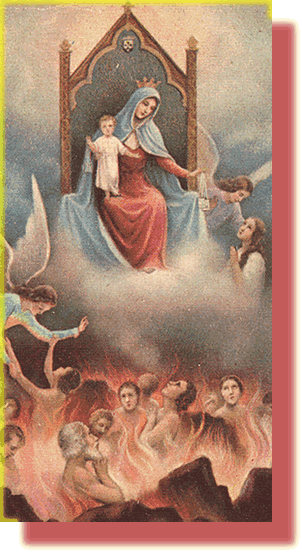
In 1932, Joseph Vissarionovich Dzhugashvili was in a bad marriage. The Alliluyevas were all high-strung and neurotic, and Nadezhda was no exception. She was also a type that Koba would later claim to detest, an intellectual "world improving" woman, a "herring with ideas." The marriage had always been strained, and now with the political difficulties coming with forced collectivisation and Stalin's ever more frequent infidelities, things were worse than ever. And so, on 9 November 1932, Nadezhda Alliluyeva-Stalina left a dinner party without her husband, went home, and shot herself through the temple.
Koba was devastated, telling friends alternately with bitterness that "She left me as an enemy!" or remorsefully "She crippled me!"
The conventional accounts of Stalin’s life take this as a turning point. Stalin is said to have lost his last link with humanity, to have become cold and calculating, to have become paranoid in his suspicious after this. The purges did begin soon there after, and their brutality would seem to offer support for this position.
But I take a contrary view.
Koba was probably, more than anything else, relieved to be out of a stifling relationship with a highly-neurotic woman. Though he had been discreetly seeing women before her suicide, afterwards he was more open, seeing ballerinas from the Bolshoi, actresses from the Moscow Arts Theater, opera singers (he preferred mezzo-sopranos), and having a series of young “housekeepers” posted to his dachas for his carnal use. These all appear to be rather above-board affairs, neither coercion nor prostitution seems to be involved, simply the seductive attraction of a hugely powerful man.
One such “housekeeper” was the nineteen year old Valentina Vasilevna Istomina who was posted to the suburban Moscow dacha of Zubalovo in 1934. Valechka, as Koba called her, was Stalin’s ideal type: shapeless, yet not fat, buxom and neat, round-faced and pug-nosed, mousy hair, simple yet clever, unlettered yet talkative, in a word wholesomely Russian. Over time she came to prominence, taking care of Koba’s personal effects, becoming in charge of the whole house-hold, and then in charge of all his houses. Koba was proud of her, in an odd sort of way, showing friends his piles of brilliantly white underwear that she kept immaculately clean and starched (surely a unique point of pride among dictators).
 By the end of the 1930’s, Stalin’s days of philandering were drawing to a close. The last such affair appears to be with a beautiful Georgian woman who was a test pilot for the Commissariat of Aviation. All sources are agreed that, after 1939, Stalin had only his Valechka as mistress, though some called her his “secret wife.” His orphan daughter, Svetlana (whom he called his “little housekeeper”) came to see her as a second mother. Commissar for Heavy Industry, “Iron Lazar” Kaganovich, told his daughter at this time that Koba loved his little Valechka. Even so, she remained in the background, serving at table as if she were simply one among many household servants.
By the end of the 1930’s, Stalin’s days of philandering were drawing to a close. The last such affair appears to be with a beautiful Georgian woman who was a test pilot for the Commissariat of Aviation. All sources are agreed that, after 1939, Stalin had only his Valechka as mistress, though some called her his “secret wife.” His orphan daughter, Svetlana (whom he called his “little housekeeper”) came to see her as a second mother. Commissar for Heavy Industry, “Iron Lazar” Kaganovich, told his daughter at this time that Koba loved his little Valechka. Even so, she remained in the background, serving at table as if she were simply one among many household servants.
In was while serving in this role that he turned to her for advice once in 1941. It was in the dreadful October of that year. The Nazi army was only twenty miles from Moscow and the order had gone out for all commissariats to make ready for evacuation. Summoning the various commissars to the Kremlin for dinner, he asked them if their commissariats were ready for evacuation. Misunderstanding the question, each of the commissars averred that they were ready to leave Moscow. Turning to the ever smiling Valechka in her white apron, Koba asked, “Valentina Vasilevna, are you preparing to leave Moscow?”
“Comrade Stalin, Moscow is our mother, our home. It should be defended!”
“That’s how Muscovites talk!” Stalin told his Politburo, thus shaming the commissars into staying in the beleaguered capital with the example of his housekeeper.
Valechka attended the war time conferences at Yalta and Potsdam with her Koba, though as always in her role as housekeeper. First Roosevelt and Churchill, and then Truman and Atlee had no idea that the round little woman who served them at table was their host’s lover. And, though diplomatic protocol demanded that the President of the United States (as head-of-state, a rank that neither the British Prime Minister nor Chairman of the Communist Party of the Soviet Union enjoyed) be served first, Valechka always attended to her Koba first.
It was at this time, while preparing for the Potsdam conference, that Valechka told Koba to cut his hair short, since he looked younger with short hair. Thus, Potsdam photos show a younger looking Stalin than do pictures from Yalta.
 On the fifth of March 1953, Stalin suffered a stroke of apoplexy. It took him hours to die, eventually drowning in his own fluids. By that time Svetlana and all of the major commissars had been called to his side. When he finally succumbed, first KGB chief Beria, and then one-at-a-time all of the others, came forth and kissed Stalin before leaving. When, at last, all of the powerful magnates were gone, Valechka pushed through the crowd around the body and threw herself on him, in Svetlana’s words, “wailing at the top of her voice as the women in the villages do. She went on for a long time and nobody tried to stop her.”
On the fifth of March 1953, Stalin suffered a stroke of apoplexy. It took him hours to die, eventually drowning in his own fluids. By that time Svetlana and all of the major commissars had been called to his side. When he finally succumbed, first KGB chief Beria, and then one-at-a-time all of the others, came forth and kissed Stalin before leaving. When, at last, all of the powerful magnates were gone, Valechka pushed through the crowd around the body and threw herself on him, in Svetlana’s words, “wailing at the top of her voice as the women in the villages do. She went on for a long time and nobody tried to stop her.”Valechka was only thirty-eight when her lover died. She is still alive, aged ninety-two and living in Moscow. And, if you ask her, she will tell you that “no better man ever walked the earth” than Stalin.
Now, my point is this: no matter how many crimes Stalin is guilty of, no matter how much human suffering he caused, no matter how many mistakes he made, he did succeed at this one human relationship. Every scrap of evidence, every bit of testimony indicates that Valechka loved her Koba with unmitigated devotion and that this love was genuine, unforced, and profound. Whatever else he may have been, Koba was the beloved of Valechka.
And you, comrade?
 When you are dead, will anyone wail over you “like a peasant woman?” Will anyone beg God to save your soul? Will anyone care if you suffer the torments of the dammed?
When you are dead, will anyone wail over you “like a peasant woman?” Will anyone beg God to save your soul? Will anyone care if you suffer the torments of the dammed?Do not think that if you have not earned someone’s love right here on earth that you will be granted divine mercy when you are dead, no matter how you might think you love Jesus. What shall it profit, my brethren, if a man say he hath faith, but hath not works? Shall faith be able to save him? Do you see that by works a man is justified, and not by faith only? For even as the body without the spirit is dead: so also faith without works is dead.


5 comments:
a part of me says that your argument is exactly backwards. does Stalin's success in this relationship, his ability to find another human being who loves him, serve as a sort of testimony against his many crimes? or does the fact that he still committed such atrocities testify against love?
I think it may be the latter. but then maybe I'm just too jaded.
очень молодые онлайн http://free-3x.com/ сосущие школьницы free-3x.com/ студенты на каникулах [url=http://free-3x.com/]free-3x.com[/url]
Very interesting tidbit of history that isn't well known - I stumbled on this post by accident while looking up "Valechka", a term used in Nabokov's Lolita. While I'm a history enthusiast, I never read much about Stalin's personal life, although he seemed to have a rather prolific (3 marriages) and bloody (a whole lot of wives of top Communists were flirted with and then killed) romantic past...
However, I completely didn't see your religious conclusion in the last part coming, I must say. I don't think it says anything that a totalitarian dictator, who cultivated a god-like image throughout his life, had a weeping woman throw herself on him after death. You especially weaken your point by mentioning that she was an uneducated houseservant who didn't know or care about a wider view - it took that kind of blind loyalty to stay Stalin's lover, or indeed alive at all, as a couple of educated wives of top Communists found out after their liaisons with him.
History's consensus on Mao and Stalin is that they were ruthless solipsists who had no problems with killing millions of innocents (women, children, former friends and allies) as part of their self-ordained "destiny". But, both still had (and have) many apologists, and millions of their people mourned their passing with lots of genuine emotion. Hitler likely would have had his share of female fanatics jumping on his coffin, had they been allowed to if he off'ed himself earlier. I don't think any religion, especially not Catholicism as I assume you advocate, would view having sincere mourners at one's death as proof of his doing "good works" on balance. Certainly, the ghastly numbers of priests, nuns, monks, and all manner of devout worshipers that all three of these dictators have murdered would guarantee them to be stewing in hell.
This isn't to discredit your overall point at all, btw - this is an interesting historical anecdote, I just don't see it as applicable to your spiritual interpretation. Good read though!
All those atrocities and camps were made by jews, who were surrounding Stalin in their hundreds, and who when they going for the power acting as a one fist and supporting each other. As soon as they get that power they start to eliminate each other. All the guys who were running those camps were also jews. Stalin did not die. He was killed, because he made attack on Karl Marks and marksizm in 1952. When the ruler of one of the most powerful and reach country in the world died he's only possession was old suit and pair of shoes. Oh, yes, and falling prices on everything - first time in history of human time.
P.S. Keep listening to your media. They've done well.
The author of festungarnulfinger.blogspot.com has written an excellent article. You have made your point and there is not much to argue about. It is like the following universal truth that you can not argue with: One in every seven days is a Thursday. Thanks for the info.
Post a Comment